- Home
- Gerald Hammond
Thin Air
Thin Air Read online
THIN AIR
Gerald Hammond
© Gerald Hammond 1993
Gerald Hammond has asserted his rights under the Copyright, Design and Patents Act, 1988, to be identified as the author of this work.
First published in 1993 by Macmillan London Limited.
This edition published in 2019 by Endeavour Media Ltd.
Table of Contents
Chapter One
Chapter Two
Chapter Three
Chapter Four
Chapter Five
Chapter Six
Chapter Seven
Author’s Note
Chapter One
I was at my desk, looking south past the blank screen of the word processor and across farmland which glowed and shimmered in the bright July sunshine. The scene represented some of the best of the Scottish Borders, fertile and ripening and punctuated by trees in full leaf; but the hills in the distance were England, still in some ways my spiritual home. I had come to love Scotland and I knew that much of the England of my youth had vanished under feet and Tarmac. But as long as there is life in the plant it is the roots that survive.
The fine weather was calling me into the great outdoors. I had been doodling, writing nothing in particular in the hope that something would take shape. Triggered by the sight of a couple dallying in the fields, I had wondered idly why there were exactly two sexes throughout nature. Leaving aside the amoeba, the invertebrate hermaphrodites and certain plants, higher up the evolutionary ladder there was never but one; and except for the uncertain example of the bees and their relatives, never three. I find an evolutionary explanation of the universe perfectly satisfying, but why had the process of evolution ordained that multisexual species should fail – or perhaps never have been tested?
Great ideas sometimes spring from such whimsical beginnings. I would rather have gone to sit in the garden for a period of toying with the thought, but Alice, who would have fought like a tigress to prevent anyone from interrupting me at my desk, could never understand that a writer may still be working while wandering around the house with a glazed expression, muttering to himself, or slouched, apparently somnolent, in a deckchair in the garden. My appearance on the lawn would have been an immediate signal for ‘Run along and play with your dad,’ and, dearly as I love our children in small- to medium-sized doses, a boy of six (or possibly seven, I could never remember) and a three-year-old girl are not ideal companions while gestating a book or groping in the recesses of the mind for the seeds of a new one.
Alice, by the way, was and is my wife, despite rumours to the contrary. When she first moved into Tansy House with me, ostensibly as my housekeeper, she made it clear that, while I would never pass for a Scot, she had no intention of letting me marry her until I could at least pass among the Scots without laying myself open to ridicule. I accepted the situation, largely because it slotted well into the tax regulations then in force.
With the passage of time I became accepted as mildly eccentric but a part of the local scene, but long before then we were recognized as a more or less married couple and Alice was invariably addressed as Mrs Parbitter. With an extension of her inverted feminine logic, she then explained that nothing would induce her to admit publicly that we had been cohabiting and we therefore sneaked off for a secret wedding from my cousin’s house in the Lothians – with the inevitable result that we were generally believed still to be living in sin.
The arrival at the front gate of a vehicle promised a welcome respite. The basket behind me creaked as Boss, my elderly Labrador, recognized the beat of the engine and raised his head. I got up and hurried out before Alice could send the visitors packing.
From my window my view of the vehicle had been cut off by the hump of rockery separating Tansy House from the narrow road. Now, from my higher viewpoint, it looked very like the jeep belonging to the Calder family. But Keith, I knew, had gone south with his wife and married daughter to spend three days at the Game Fair.
Heads began to appear as I descended the steps. Keith might be away in the family car but his jeep was still around. All three occupants were connected to him. The driver, a thin man with a full head of greying hair and a serious expression, was Wallace James, Keith’s partner in the gunshop. The large and rough-hewn man in hairy tweeds was Ronnie, Keith’s brother-in-law. And climbing with difficulty out of the back was Ian Fellowes, who was both Keith’s son-in-law and a CID Inspector. (The arrival of the local CID chief failed to worry me. The post was usually almost a sinecure. Ian dealt faithfully with the minor crimes that occur in any rural division. Anything more serious brought down the bigger wheels from Edinburgh and Ian was relegated to the position of supplier of local knowledge and liaison man with the uniformed branch.)
‘Coffee or beer?’ I asked. ‘Or a dram?’
‘A dram,’ Ronnie said predictably.
But Wallace shook his head. ‘Thanks,’ he said, ‘but we’ve just had. We’re here to ask if you’d like to come rabbiting.’
‘Failing which,’ Ian said when I showed surprise, ‘Boss. Keith took his dogs to the Game Fair with him and we don’t have a decent retriever between us.’
All was now clear. I did not and do not shoot. I have come to terms with the need to control rabbits, pigeon and corvids although something in me recoils from the act of killing. But I had inherited Boss as a trained gundog. I had kept up his training because he seemed to enjoy it, and I had even worked him at picking up on the local shoots, which I justify to myself as an act of mercy in preventing pricked birds escaping to suffer.
‘Boss wouldn’t want to go without me,’ I said. This was clearly untrue. Boss was frisking around his old friends and sporting companions like a young pup. ‘Come in while I fetch my boots.’
‘C-catch us up,’ Wallace said. He has an occasional nervous stammer which disappears as he settles down. ‘We’re only going to Easter Coullie.’ He nodded to where, beyond the road and a few fields, the buildings of Easter Coullie Farm fitted comfortably into the landscape. ‘Keith’s syndicate is the shooting tenant. Old Murdo says that if we don’t do something about the rabbits he’ll let somebody else in.’
‘And that could be any poaching bugger,’ Ronnie added.
‘Don’t start without me,’ I said, and they squeezed themselves back into the small vehicle.
Easter Coullie would be dry in such weather. Leather boots would do, rather than Wellingtons. I changed my footgear, grabbed a thumbstick and told Alice where we were off to. Rather than take the nearly new BMW onto farmland, I set off on foot with Boss trotting happily at my heel. The old boy knew that an outing, when he had already had his morning stroll, and especially when preceded by a visit from several of his shooting acquaintances, presaged an emergence from limbo and a few hours of return to glorious life.
*
Cutting across a field containing some sheep which Boss treated as invisible, I vaulted a fence and followed the unsurfaced farm road towards the stone gable of a large barn. The road jinked slightly, left and then right, into a large farmyard which lay between the open front of the barn and the gable of a traditional farmhouse. The barn was backed by a tractor shed and a mini-labyrinth of other farm buildings in stone and slate. Most were in a good state of repair although I could see grass in the gutters.
As we rounded the corner of the barn, with my mind on the shooting to come, I heard a bang above my head and I jumped and dropped my thumbstick. ‘Sorry,’ said a voice. Boss was peering round, looking for something to retrieve.
I looked round and up. Planks on trestles blocked half the open front of the barn. Duggie Bracken, the local joiner and Jack-of-all-trades, was up there beside what seemed to be a new steel girder spanning the front of the barn and his van was tucked inside with its
doors open. He pulled off his ear protectors.
‘I thought I’d been shot,’ I told him.
‘Well, you’re no’,’ he said. The smile was missing from his habitually cheerful face. He had done some work at Tansy House and usually bubbled with good humour. ‘It was only the Hilti spit-gun.’
I raised a hand in forgiveness and farewell and walked on. The jeep, I could see, had been driven through the farmyard and stopped a few yards up the rough farm track that continued south between the fields.
There was a small car in the yard, far from new, painted a pink which verged on the indecent, but lovingly polished. The tenant farmer, Old Murdo as he was always known, to distinguish him from his second son, was beside the gate to the walled garden of the farmhouse. He was conversing in low tones with a stout, blonde woman whom I had consulted once about Boss’s ageing pains and had often seen in that or a similar car, tearing around the country roads with a mad, whirring sound.
(Alice, on reading the above words, remarked that no doubt the car had also been making odd noises. Alice never did take to Jean Mather. Not many did.)
Old Murdo Heminson had always been a cantankerous individual, quick to defend what he regarded as his rights, and it seemed to me that he had been getting worse of late. He broke off to shout at me. ‘Hey! You! Where you taking yon dug?’ His square face was set in an ugly frown which was lent emphasis by his bad colour.
‘To join the rabbiting party,’ I said, and I walked on quickly past him. Old Murdo’s temper was notorious and when the black mood was on him he was best avoided.
My answer had only partially deflated him. ‘Keep the bugger awa’ fae my yowes, or else. You hear me?’
I refused to kowtow to him but I was not going to provoke a shouting match. I let my head bob in a faint suggestion of a nod and kept walking. He turned back to the woman. ‘The beast died,’ I heard him say, ‘and you can hae me afore the shirra, gin you’re so minded. I’m no’ payin’ you to let my cattle die. Now go an’ see to that yowe, an’ if you make a job o’t I’ll maybe pay you for that.’
Bullying tactics towards the local professionals were unlikely to stand him in good stead, but it was no business of mine. I hurried out of earshot, towards the narrow end of a long rape-field almost ready for cutting. The yellow flowers had brought us an illusion of sunshine during the spring.
The jeep was parked in an open space where a second track ran off to the west, giving access to the south side of the farm buildings and some further fields. The rabbiting party was unsleeving guns and donning cartridge belts. Ronnie was transferring ferrets into a carrying box.
‘It’s the wrong time of year for ferreting, isn’t it?’ I asked curiously. No information is ever superfluous to a writer.
‘I wouldn’t put ’em down a burrow,’ Ronnie said. ‘They’d kill underground and stay down. It’s the cowps of stones we’ve to clear. They’ll not have young in there. Too cold. Here, you’ll be needing a wipe of this.’ He handed me a jar of insect repellent cream. ‘There’s clegs and a’ damn thing where we’re going.’
A cleg is a horsefly and its bite can go septic. I smeared the cream liberally over my exposed surfaces.
‘Your job,’ Wallace said, ‘with Boss, is to stop them bolting back among the stones we’ve just cleared.’
I had worked that ground with Keith in the past and knew it for difficult territory. ‘What about the holes?’ I asked. ‘The banking’s riddled with them.’
‘Never heed them,’ Ronnie said. ‘Young Murdo will be following behind us with the gas.’
There was a moment’s hiatus. I had come to terms with the shooting of rabbits, over dogs or ferrets or by stalking, each of which methods demands fieldcraft by the hunter and gives the rabbit a sporting chance of escape. Gassing underground is a nasty business. Sometimes necessary but always nasty. I think that the others felt the same.
‘Well, at least we won’t have to worry if we shoot a few milky does,’ Ian said. ‘The young won’t be left to starve. Who’s that in the farmyard with Old Murdo? A fat woman with a pink car?’
‘The vet’s new assistant,’ Wallace said. ‘Not his usual style.’ The local vet, a widower, was noted for choosing young and attractive females to assist him. Somehow they never stayed for very long.
‘Old Murdo was refusing to pay a bill when I went by,’ I said. ‘Something to do with a beast that died.’
‘He was coughing up a cheque to Duggie as we passed,’ said Ian, ‘and not looking too happy about it. I suppose the poor woman got the backlash. She’ll send her boss to sort him out. Everyone set?’
Ronnie handed me his gun, picked up the ferret box and led the way south along the track away from the farm buildings, between a large field of barley and a pasture containing young bullocks. The barley was separated from the rape by a windbreak hedge where blackbirds sometimes nested. When I looked over my shoulder I could see Young Murdo plodding after us, carrying a spade and a sack.
Close to the farm boundary a stream had cut a wide arc through the land. The stream itself was modest, but I had seen it rise in spate after heavy rains. It had made a small gully for itself, varying from thirty to sixty feet wide and ten feet deep at the most, fringed on both sides by occasional trees. Beyond the stream the further embankment, which rose up to the boundary fence, was scarred with rabbit holes.
A cock pheasant was pacing along beside the stream. Ronnie waved his hat at it. ‘Awa’ back where you belong,’ he said. The bird looked at him with disdain and then took off, whirring up and over the boundary.
‘Why bother?’ I asked. ‘Keith has the shooting here.’
‘Och, we don’t shoot Easter Coullie more than once or twice a year. It’s not worth the argy-bargy with Old Murdo. We pay him for the shooting rights to stop him letting them to any other bugger. He’d be just as likely to plant artichokes along the boundary to draw our birds across.’
The gully, which was bright with wildflowers, could have been a beauty spot except that for generations the stones uncovered in the fields, ranging from the size of a man’s head up to that of a water-butt, had been tipped over the nearer edge until some of the mounds almost reached the level of the surrounding land. When our heads topped the rise, the flat bed of the gully had seemed to move as rabbits bolted, some to the holes in the bank and others into the piles of boulders. The barley crop was sparse and stunted for fifty yards out from the gully, clearly marking the territory where the rabbits fed.
Talk had ceased and we were moving quietly. Rabbits will sometimes stay and take their chance with the ferret rather than bolt if there has been too much disturbance above ground. Ronnie took his gun from me and pointed to the left. Boss followed me a little way down the valley to where our presence would deter any escape into some rough ground beyond.
Rabbits could have avoided a single ferret for hours in the myriad passages below the big stones. Ronnie put all four of his jills in and then took his place. The three men were all on the first heap of stones, facing outwards. They had worked as a team before. Young Murdo arrived and joined me in silence. He took an air rifle out of his sack, cocked and loaded it. I saw Ian, the nearest of the Guns, take note of our position and I gave him a wave.
‘Your dad’s on the rampage this morning,’ I said quietly.
I rather liked Young Murdo and I think that he liked me. He was certainly more prepared to pass the time of day with me than he was with most others. Some considered him dour but I had only found him solemn and somewhat introspective. Unlike his father, he had seemed rather happier on the few recent occasions when I had bumped into him. But this was not one of his most cheerful days.
‘When was he ever not?’ he said glumly.
‘He’s been getting on at you, has he?’
‘You could say that.’
The still scene suddenly came to life. The first rabbits bolted and there was a flurry of shots. Then all was quiet again. The rabbits were warned and the ferrets would be having to work h
ard to push them out.
One rabbit was hard hit but alive, jumping and squirming in the grass. I was about to send Boss for it so that I could administer the coup de grâce, regardless of risk to him from any more shots, but Young Murdo fired once with his air rifle. The sound was insignificant after the slamming of the shotguns, but the rabbit jumped once and lay still, about twenty yards from us.
‘I can’t abide to see anything suffer,’ he said quietly.
‘And you a farmer’s son?’ I said.
He frowned. He was only about sixteen, I judged – a stocky youth with a gentle face below curly hair which had obviously been cut at home. ‘I make it easy for them, if I can. There’s no need for cruelty.’
I nodded my heartfelt agreement. ‘It was a good shot,’ I said.
‘I can kill them dead at three times the range when I want.’ The effect was spoiled by a huge yawn. I took the boast with a pinch of salt. I may not know much about guns, but I had had an airgun in my youth and sixty yards is a very long shot.
The ferrets seemed to have pushed the rabbits to the far end of the stones. Ronnie and Wal were shooting steadily but Ian was being left out of the action.
‘I’m surprised you don’t have a shotgun,’ I told Young Murdo.
His frown became a scowl. ‘Dad won’t hear of it.’
The shooting ceased. One by one the ferrets surfaced and were gathered. Boss did his share of the picking up, his tail beating like a metronome. Eleven rabbits were gutted and hung in a handy tree to cool and the shooters moved on a hundred yards to where the next dump of rocks leaned against the slope. I washed my hands in the stream – I had no objection to dealing with the meat once it was deceased. The water was delightfully cool. Boss and I stood guard over the stone pile that had already been cleared.
The second heap of stones produced only one undersized rabbit but at the third, the largest of the lot and spread over fifty yards of banking, the shooting went on and on as the ferrets cleared passage after passage. When I looked back, Young Murdo had fallen far behind us. I could still see him, wearing a mask and gloves, spooning Cymag down each hole, filling in the hole quickly with earth and stamping it down. Cyanide gas is not to be trifled with. From time to time he glanced up at a small knoll which marked where the boundary turned away from the gully. From my window, I had sometimes seen a girlish figure lingering on the knoll. Perhaps Young Murdo’s recent cheerfulness was explained.

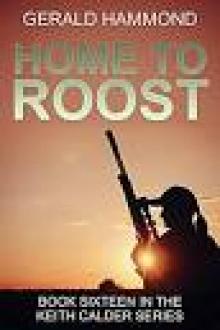 Home to Roost
Home to Roost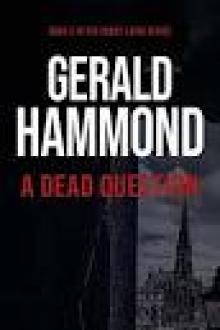 A Dead Question
A Dead Question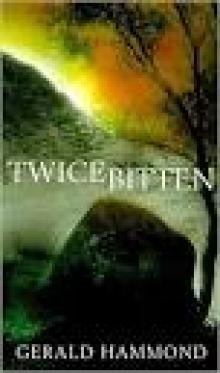 Twice Bitten
Twice Bitten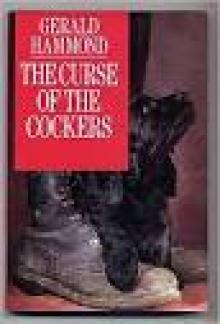 The Curse of the Cockers
The Curse of the Cockers In Loving Memory
In Loving Memory Illegal Tender (Three Oaks Book 12)
Illegal Tender (Three Oaks Book 12) Cold Relations (Honey Laird Book 1)
Cold Relations (Honey Laird Book 1)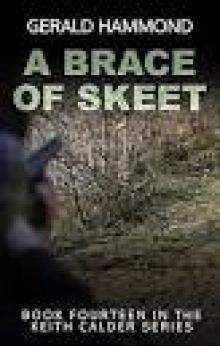 A Brace of Skeet
A Brace of Skeet Silver City Scandal
Silver City Scandal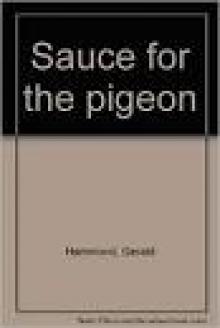 Sauce For the Pigeon
Sauce For the Pigeon Cold Relations
Cold Relations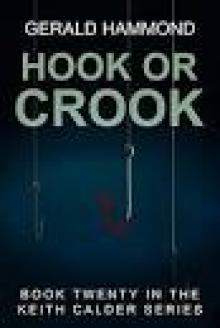 Hook or Crook
Hook or Crook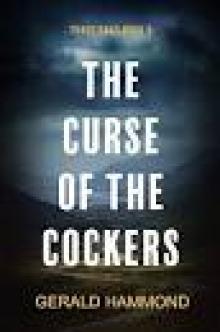 The Curse of the Cockers (Three Oaks Book 5)
The Curse of the Cockers (Three Oaks Book 5)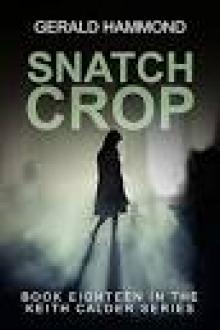 Snatch Crop
Snatch Crop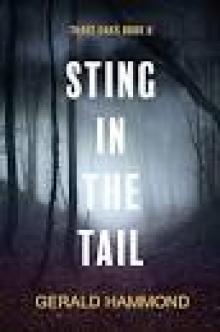 Sting in the Tail (Three Oaks Book 6)
Sting in the Tail (Three Oaks Book 6)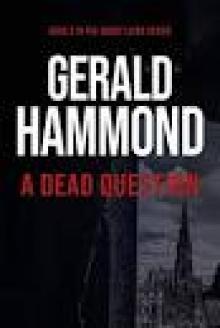 A Dead Question (Honey Laird Book 2)
A Dead Question (Honey Laird Book 2)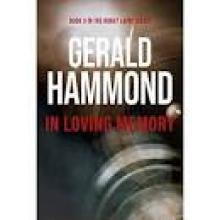 In Loving Memory (Honey Laird Book 3)
In Loving Memory (Honey Laird Book 3) Thin Air
Thin Air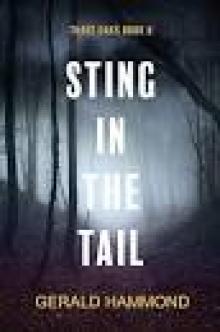 Sting in the Tail
Sting in the Tail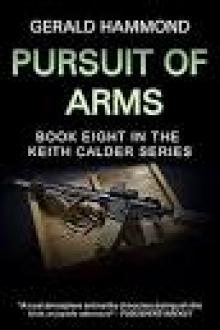 Pursuit of Arms
Pursuit of Arms The Game
The Game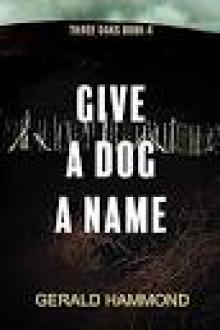 Give a Dog a Name (Three Oaks Book 4)
Give a Dog a Name (Three Oaks Book 4) Fair Game
Fair Game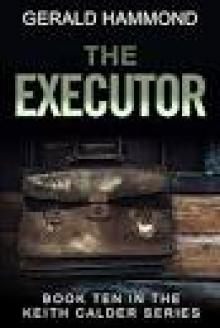 The Executor (Keith Calder Book 10)
The Executor (Keith Calder Book 10) Whose Dog Are You? (Three Oaks Book 2)
Whose Dog Are You? (Three Oaks Book 2)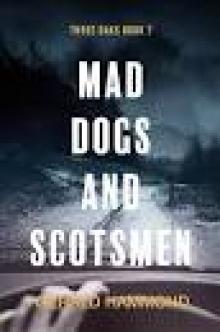 Mad Dogs and Scotsmen (Three Oaks Book 7)
Mad Dogs and Scotsmen (Three Oaks Book 7) Cousin Once Removed
Cousin Once Removed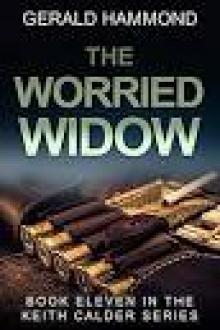 The Worried Widow
The Worried Widow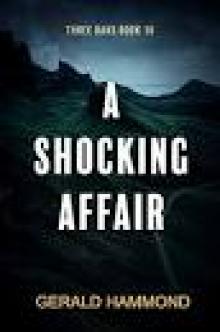 A Shocking Affair
A Shocking Affair Dead Weight (Three Oaks Book 11)
Dead Weight (Three Oaks Book 11) Whose Dog Are You
Whose Dog Are You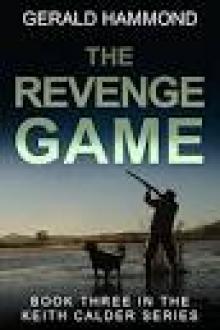 The Revenge Game
The Revenge Game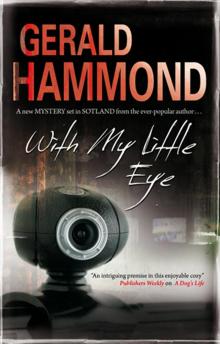 With My Little Eye
With My Little Eye Doghouse (Three Oaks Book 3)
Doghouse (Three Oaks Book 3)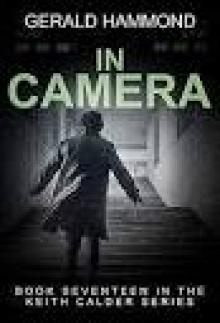 In Camera
In Camera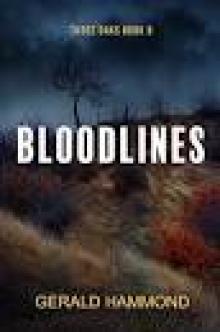 Bloodlines (Three Oaks Book 8)
Bloodlines (Three Oaks Book 8)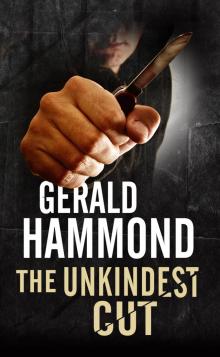 The Unkindest Cut
The Unkindest Cut